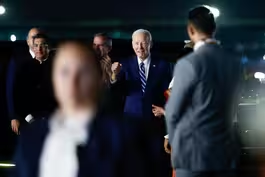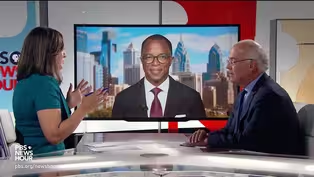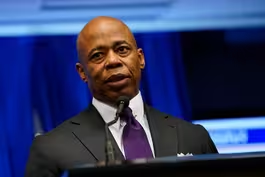
Nursing homes staffing requirements could be hard to meet
Clip: 9/8/2023 | 5m 42sVideo has Closed Captions
Why new federal staffing requirements for nursing homes could be difficult to meet
The Biden administration has proposed new staffing standards to improve care for the 1.3 million Americans living in nursing homes. And while it's the biggest change to regulations in three decades, many patient advocates say it still falls short of what's needed. Stephanie Sy discussed the plan with David Grabowski, a healthcare policy expert and professor at Harvard Medical School.
Problems playing video? | Closed Captioning Feedback
Problems playing video? | Closed Captioning Feedback
Major corporate funding for the PBS News Hour is provided by BDO, BNSF, Consumer Cellular, American Cruise Lines, and Raymond James. Funding for the PBS NewsHour Weekend is provided by...

Nursing homes staffing requirements could be hard to meet
Clip: 9/8/2023 | 5m 42sVideo has Closed Captions
The Biden administration has proposed new staffing standards to improve care for the 1.3 million Americans living in nursing homes. And while it's the biggest change to regulations in three decades, many patient advocates say it still falls short of what's needed. Stephanie Sy discussed the plan with David Grabowski, a healthcare policy expert and professor at Harvard Medical School.
Problems playing video? | Closed Captioning Feedback
How to Watch PBS News Hour
PBS News Hour is available to stream on pbs.org and the free PBS App, available on iPhone, Apple TV, Android TV, Android smartphones, Amazon Fire TV, Amazon Fire Tablet, Roku, Samsung Smart TV, and Vizio.
Providing Support for PBS.org
Learn Moreabout PBS online sponsorshipAMNA NAWAZ: The Biden administration has proposed new staffing standards to improve care for the 1.3 million Americans living in nursing homes.
And while it is the biggest change to regulations in three decades, many patient advocates say it still falls short of what's needed.
Stephanie Sy has the details.
STEPHANIE SY: The COVID pandemic spotlighted how understaffing and low pay in nursing homes led to many tragic outcomes, with a disproportionate number of nursing home residents and workers dying.
The new proposed rule called for more nursing care, the equivalent of about three hours of care per day per resident, with 33 minutes of that care being delivered by a registered nurse, the rest by nurse's aides.
Currently, three-quarters of nursing homes do not have enough staff to meet these minimums.
David Grabowski is a health care policy expert and professor at Harvard Medical School.
He joins me now to share his reaction.
David, thank you for being on the "NewsHour" again.
There are currently, from what I understand, no enforceable standards for nursing home staffing.
Is it widely agreed that this was needed?
And do you think it's enough to address the problem?
DAVID GRABOWSKI, Harvard Medical School: So, I think it was absolutely needed.
We have been talking about this as far back as the 1986 Institute of Medicine report, so this has been longtime coming.
We have had a number of us nursing homes that are understaffed, too much turnover, low safety, poor quality.
Is it enough, to the second part of your question?
I don't think so.
You said the numbers there, three hours per resident per day.
These individuals are medically complex.
They have a lot of functional limitations, a lot of needs.
So, three hours is a great start.
The administration deserves a ton of credit for putting this rule forward.
It's probably the biggest reform in nursing homes in decades, but we still have a ways to go.
STEPHANIE SY: But the reality is, as you know, the nursing home industry is already having a hard time attracting and retaining staff as it is, without the standard.
So, even with this rule, can it be implemented?
DAVID GRABOWSKI: Timing is everything, and we're in the middle of a staffing shortage.
So this is a terrible time to implement a staffing standard in U.S. nursing homes.
That said, it's never been more needed than it is today.
So that's really the balancing act that the administration is facing.
I think the administration built in a lot of measures within this policy to help out nursing homes that are suffering from staffing shortages in their local markets.
So they have given any facility that can't find staff at the prevailing wages, and they meet a series of criteria, they have been given an exemption under this policy.
They have also given a long implementation period in nursing homes, three to five years.
And then, finally, the administration has put $75 million into this growing the next generation of nursing home caregivers.
So, is that enough?
No.
We need to figure out ways to grow this work force.
But I think these measures are a way to sort of help nursing homes that are really facing an unprecedented work force shortage.
STEPHANIE SY: Part of the problem Biden administration officials have pointed to are private equity firms' buyouts of private nursing homes.
They say that that's contributing to the staffing shortages, because they imply those firms put profit over patient care.
Have you seen evidence of that?
Is that a big factor here?
DAVID GRABOWSKI: I think that's a big part of the story.
Ownership -- we don't have a lot of those mom-and-pop-owned nursing homes that we had 20, 30 years ago.
There are -- these are corporations.
They're often very complex corporations with many layers.
And it's hard for policymakers to follow the dollars.
And, so, many of those dollars don't end up in direct resident care.
They don't end up in the pockets of staff.
They unfortunately end up in other parts of the organizations through what are called related party transactions.
So, private equity, real estate investment trusts and lots of other complicated ownership structures have emerged in this industry and really, I think, helped push along the kinds of reforms that we're now thinking about, like a minimum staffing standard, where I think 20, 30 years ago this -- we were talking about this policy, but it wasn't as needed as it is today, because we didn't have the same set of owners that we do today.
STEPHANIE SY: And should the government be ponying up more money to pay nursing home staff?
DAVID GRABOWSKI: If you talk to individuals in the industry, it's a billion-dollar question.
So, there are some nursing homes that haven't put enough dollars back into direct resident care and.
This policy will help discipline those nursing homes.
They can no longer siphon off dollars away from direct resident care, those private equity groups we were just talking about.
They will have to put those dollars back into direct resident care.
Other nursing homes may really struggle.
I said earlier this policy is hopefully a start.
It's not just a start with staffing.
I hope it's a start towards a more comprehensive set of reforms.
STEPHANIE SY: We will see.
David Grabowski at Harvard Medical School, thanks so much for sharing your expertise with the "NewsHour."
DAVID GRABOWSKI: Thank you, Stephanie.
Biden's goals for G20 summit in India and visit to Vietnam
Video has Closed Captions
Clip: 9/8/2023 | 4m 25s | What Biden hopes to accomplish at G20 summit in India and visit to Vietnam (4m 25s)
Brooks and Capehart on the Hunter Biden investigation
Video has Closed Captions
Clip: 9/8/2023 | 10m 17s | Brooks and Capehart on the Hunter Biden investigation and migrant crisis in New York (10m 17s)
Coco Gauff's journey to the U.S. Open finals
Video has Closed Captions
Clip: 9/8/2023 | 4m 25s | Coco Gauff's journey to the U.S. Open finals and the new generation of tennis (4m 25s)
Ga. grand jury recommended charges for more Trump allies
Video has Closed Captions
Clip: 9/8/2023 | 5m 9s | Georgia grand jury recommended charges for 21 additional Trump allies in election case (5m 9s)
Mexico latest Latin America country to loosen abortion laws
Video has Closed Captions
Clip: 9/8/2023 | 6m 52s | Mexico becomes latest country in Latin America to loosen restrictions on abortion (6m 52s)
NYC mayor on migrant crisis he says will 'destroy' the city
Video has Closed Captions
Clip: 9/8/2023 | 9m 53s | New York Mayor Eric Adams discusses migrant crisis he says will 'destroy' the city (9m 53s)
Providing Support for PBS.org
Learn Moreabout PBS online sponsorship
- News and Public Affairs

FRONTLINE is investigative journalism that questions, explains and changes our world.

- News and Public Affairs

Amanpour and Company features conversations with leaders and decision makers.












Support for PBS provided by:
Major corporate funding for the PBS News Hour is provided by BDO, BNSF, Consumer Cellular, American Cruise Lines, and Raymond James. Funding for the PBS NewsHour Weekend is provided by...





